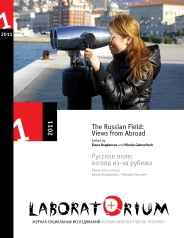Власть гламура в современном российском обществе. Значение одежды и внешности в городской культуре. Резюме
The Power of Dress in Contemporary Russian Society: On Glamour Discourse and the Everyday Practice of Getting Dressed in Russian Cities
Author(s): Katharina KlingseisSubject(s): Social Sciences
Published by: Центр независимых социологических исследований (ЦНСИ)
Summary/Abstract: Robert Pfaller has argued that glamour has declined in the public space of Western societies in response to calls for more authenticity voiced in the cultural revolution of 1968. Among the urban middle class in post-Soviet Russia, in contrast, glamour continues to serve as an ideological representation of power. Helped by glamour ideology, status rituals banned from official discourse throughout the Soviet era have gone from “collective repressed” to cultural imperative. Based on interviews with three generations of women in Yekaterinburg and in and near Moscow, the article analyzes glamour as a micro-mechanism of power (Foucault). For women socialized under Stalin, elegance under conditions of scarcity was a matter of inventiveness. For the Khrushchev generation, glamour is related to normative notions of taste, status, and femininity. For young urban professionals today, dress is a tool for achieving professional and private goals.
Journal: Laboratorium. Журнал социальных исследований
- Issue Year: 3/2011
- Issue No: 1
- Page Range: 170-176
- Page Count: 7
- Language: Russian

